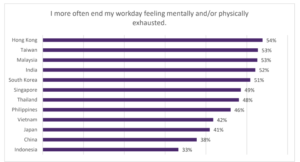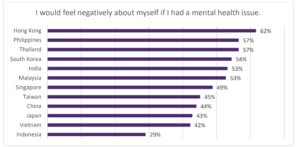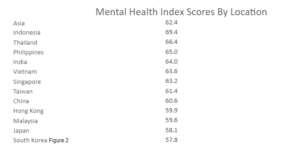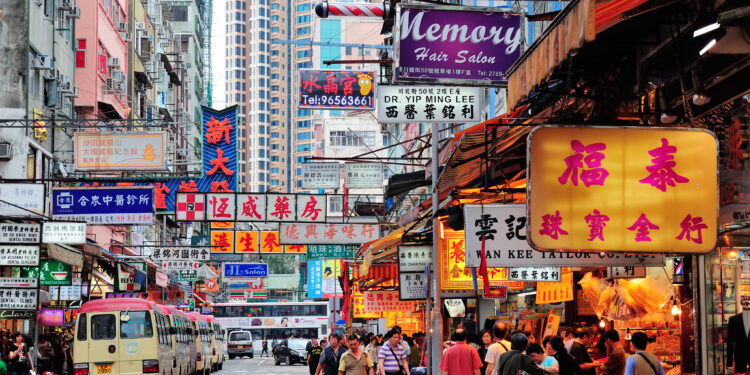Employees in Hong Kong experience the highest levels of mental or physical exhaustion at the conclusion of their workday, according to a report on the state of mental health across 12 Asian markets by Aon and Telus Health.
The Aon TELUS Health Asia Mental Health Index report, released today, explored workplace mental health and the impact on productivity in 12 markets across Asia.
Overall, the report stated that 82% of workers in Asia have a high (35%) to moderate (47%) mental health risk, highlighting a growing concern of workplace wellbeing in Asia.
And a total of 54% believe their career options would be limited if their employer knew they had a mental illness.
To create the Asia Mental Health Index (MHI), a scoring system was applied to turn individual responses into point values. Higher point values are associated with better mental health and lower mental health risk.
An overall MHI score out of 100 is generated by dividing the sum of scores by the total number of possible points, with scores between 80 and 100 indicating optimal mental health and mental health risk. Scores between 50 and 79 represent a ‘strained’ mental health level, while those from zero to 49 represent ‘distressed’ mental health and a higher mental health risk
The overall MHI score for Hong Kong stands at 59.9, indicating that the mental health of employees there is strained at 2.5 points lower than the median score of 62.4.
A total of 39% of employees in Hong Kong felt anxious, 33% depressed and 32% isolated.
Feelings of exhaustion
But when it came to feeling mentally or physically exhausted, Hong Kongers topped the list.
On average, a total of 47% across Asia said they end their workday feeling mentally and/or physically exhausted.
But in Hong Kong, a total of 54% of the employees interviewed said they were most likely to end the workday feeling mentally and/or physically exhausted – eight percentage points higher than the Asian average.
But Hong Kong was only just ahead of three other Asian countries, including Taiwan at 53%, Malaysia also at 53% and India at 52%.
Employees under 40 years of age were nearly 50% more likely than employees older than 50 to feel mentally and/or physically exhausted at the end of their workday.
The lowest ranked country for mental and physical exhaustion was Indonesia at 33%.

Insights shared throughout the report reflected data gathered by surveying 13,000 workers living in 12 Asian locations, including China, Hong Kong, India, Indonesia, Japan, South Korea, Malaysia, Philippines, Singapore, Taiwan, Thailand and Vietnam.
At least 1,000 people responded to the survey in each location. All respondents were employed at the time of the survey or were employed within the prior six months. Participants represent a range of ages, genders and industries, and were asked to consider the prior two weeks when answering the questions
Mental health stigma
Hong Kongers also stood out as being the most likely to have a stigma about mental health, with nearly half saying they would feel negatively about themselves if they had a mental health issue.
To test for negative self-stigma, employees were asked if they would feel negatively about themselves if they had a mental health issue.
Across the 12 Asian markets, a total of 49% of respondents said they would feel negatively about themselves if they had a mental health issue.

But that rate was far higher in Hong Kong, where 62% of respondents said they were likely to experience self-stigma.
Hong Kong was followed by the Philippines at 57% and Thailand also at 57%.
Indonesia once again was the lowest ranked, with a score of 29%.
Other key findings
Key findings on workplace productivity showed that 45% of respondents across the region report that their mental health is negatively impacting their work while stress, anxiety and burnout are on the rise.
“Asian workers managing growing work, home and social pressures, stigma surrounding mental health and the impact of Covid pandemic have contributed to the deterioration of mental health,” the report said.
Overall, the country in Asia with the lowest level of strain was Indonesia, with the highest mental health index score of 62.4.
The country with the highest NHI was South Korea, with a score of 57.8
Hong Kong ranked fourth highest, behind Japan in second place and Malaysia in third. China ranked fifth, was just behind Hong Kong.
In comparison, Singapore ranked 7th on the list of 12 Asian locations.

The report identified public and self-stigma is an overwhelming problem for workplaces and society across Asia.
The report also stated that 54% of employees believe their career options would be limited if their employer knew they had a mental health issue, while 49% said they would worry that friends and family would treat them differently and 49% reported they would feel negatively about themselves.
Tim Dwyer, chief executive officer (CEO), Health Solutions, Asia Pacific, Aon, said: “Organisations that do not implement support structures or choose to dismiss the impact of mental health in their workplace will realise there is a significant cost in doing nothing.
“Supporting employees’ wellbeing is necessary for organisations to maintain high levels of engagement and productivity to deliver measurable return on investment.
“Lack of support and the stigma attached to mental health issues are key barriers on why employee mental health issues remain unresolved.
“Organisations must therefore address these issues head-on while developing an integrated strategy informed by data and insights.”
Jamie MacLennan, managing director of APAC at Telus Health, said: “The prevalence of overwhelming and crippling levels of stress within the workplace simply cannot go ignored; far too many people in Asia are dealing with elevated stress, anxiety, isolation and depression, which has a direct correlation to workplace productivity.
“Many businesses are still not taking the mental health of their staff seriously and when not addressed and supported will lead to decreased productivity and increased absenteeism and presenteeism.
“Addressing the mental health and wellbeing of staff is no longer a ‘nice to have’ – rather, it is a commercial imperative.”






